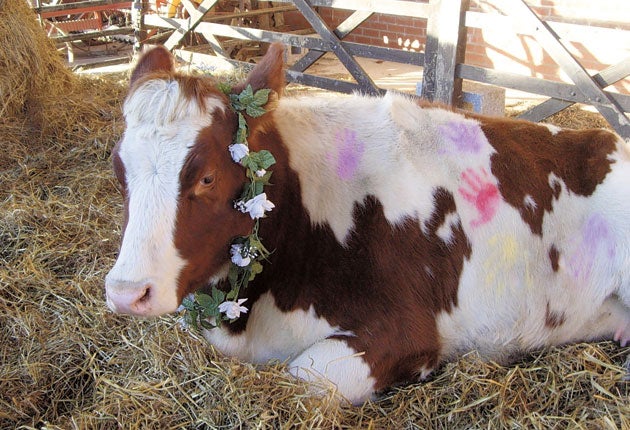Where cows are waited on hand and hoof
A new Hare Krishna farm will treat its bovine residents to five-star luxury

The attorney General may be the guest of honour at the opening of Bhaktivedanta Manor's new farm today, but his status as a VIP will be overshadowed by a host of far more glamorous brown-eyed creatures.
At New Gokul, already dubbed the "Hilton of farms", cows are worshipped by the Hare Krishna devotees who lovingly chant Sanskrit mantras and play relaxing music to them as they are milked or fed their favourite cabbage, carrots and jagari – raw sugar cane.
When Dominic Grieve QC MP cuts the ribbon and unveils the plaque at the £2.5m centre, he will do so under the docile gaze of 44 cows and bulls, adorned in flowers and brushed with coloured paint powders by devotees.
Among those attending – along with the Hare Krishna spiritual leader His Holiness Bhakti Caru Swami, a variety of MPs, mayors and inter-faith representatives – will be Aditi and her calf Gangotri.
Aditi, a two-year-old brown and white Meuse Rhine Issel, rose to prominence as a bovine peace offering after a very public and acrimonious dispute between Bhaktivedanta Manor, the UK headquarters of the International Society for Krishna Consciousness, and the RSPCA three years ago. Devotees from the Hertfordshire temple were outraged after the society insisted on humanely putting down a 13-year-old Belgian blue-jersey cross named Gangotri when it became injured during mating, despite their assertions that it was sacrilegious to kill a cow.
A year later, the RSPCA conceded it had offended religious sensibilities and donated Aditi as a peace offering. When its calf was born a month later, it was named after its late predecessor.
"Aditi and Gangotri are both well," explained communications secretary Radha Mohan Das. "They will be special VIP cows at the event – but then, all our cows are stars."
The project claims to be the blueprint for future sustainable farming. Its bovine occupants – who graze on land donated by the former Beatle George Harrison to the Hare Krishna movement – live in luxurious, hay-filled pens where monks play music and sing chants each morning as the cows are milked. Milk is only taken from the cows by hand, and after their calves have had their fill. Every animal can expect to live to an old age without fear of the abattoir.
"One very devoted lady came and started playing her harp to them the other day," said Mr Das. "They really are the stars of our community; such sweet animals. We see our cows in the way a young child might see their pet dog. They are treated like the VIPs of the cow world and they can be quite bossy sometimes."
Tractors are banned, so bulls plough the fields that provide vegetables for both human and bovine occupants as well as working the mill to grind grain for flour.
Asked why the Attorney General had been invited to attend the opening, Mr Das said: "We have a long-standing relationship. He has a particular interest in cows and rural aspects of the community. We did try and get the most senior person possible, but the Prime Minister was a little bit too high."
Surrounded by 30 saffron-clad priests chanting 5,000-year-old Vedic mantras as well as thousands of devotees celebrating the Hindu feast of Diwali, Mr Grieve will watch the welcoming ceremony involving the lighting of a Yajna sacred firepit surrounded by four traditional altars. The rites will be completed with the first ceremonial entrance of the cows and bulls into their new home with prayers for peace and safety.
Guests will be treated to traditional dances, ox-power demonstrations – and some of what the farm acknowledges is the most expensive milk in Britain. Mr Das said the farm hopes to start selling it at £3 litre, explaining that the price might be high, but people will be willing to pay more for a "compassionate alternative".
"If you drink milk from the supermarket, you may be drinking milk from a cow that is not alive any more," Mr Das said. "We will take pleasure when people make the ethical choice to drink the milk from cows treated with love and care throughout their lives – it will be worth the cost."
Join our commenting forum
Join thought-provoking conversations, follow other Independent readers and see their replies
Comments